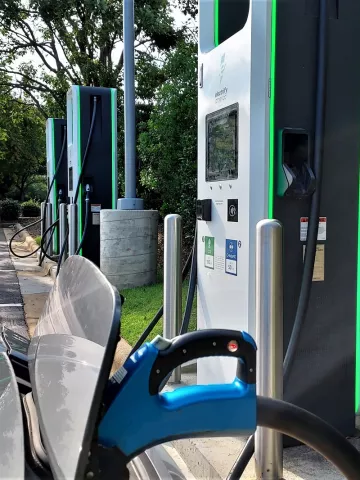Just over a year ago, Gov. Roy Cooper directed state agencies to come up with a clean transportation plan that will slash carbon emissions, expand adoption of zero-emission vehicles and infrastructure to support them, and help North Carolina gain mileage on our way to being the "Green Roads State."
What progress have we made since then? What's next on our route?
Cooper's Executive Order 246, issued in early January 2022, set a goal of cutting North Carolina’s greenhouse gas emissions by 50% from 2005 levels by 2030, reaching net zero emissions by 2050. The Clean Transportation Plan mandated by the order set a statewide goal of getting 1.25 million ZEVs on the road by 2030.
The plan is still being drafted, with a final version due on Cooper's desk in April. But even as its details are still being negotiated, the state is taking action to reach its goals.
Clean Transportation Plan
Throughout 2022, the N.C. Chapter and national Sierra Club staff participated in public comment sessions and working groups to offer guidance on the Clean Transportation Plan's elements including electric vehicle fleets, EV charging investments, and equitable development. We also worked with allies to publish a report on EV adoption, "Transforming Transportation In North Carolina."
Thanks to our Sierrans and allies who also participated, submitting ideas and comments in meetings and working groups, and via online and emailed comments.

What's next? NCDOT's draft Clean Transportation Plan is due to be posted on the agency's website on March 1 in conjunction with a virtual public information session. A public comment period will run from March 1 to March 15. Keep an eye on our website and social media, and subscribe to our email alerts (use the sign-up box on this page) for guidance on how and when to participate.
Other Green Roads miles traveled
The state continues to help rural counties by awarding funds from the Volkswagen settlement and by providing thousands of rebate dollars from the N.C. Department of Environmental Quality (DEQ) to add to a statewide ZEV charging network.
The federal government has pitched in. To expand the ZEV network, the Federal Bipartisan Infrastructure Law will provide our state with $109 million. The N.C. Department of Transportation (NCDOT) released an Electric Vehicle Infrastructure Deployment Plan in August to use these funds.
NCDOT hired Jen Weiss as the Senior Advisor for Climate Change Policy to oversee implementing the North Carolina Clean Transportation Plan. Over the past year, Weiss (who departs at the end of this month to join the N.C. Clean Energy Fund) has conferred with all of the transportation stakeholders to get their input on reaching this goal. NCDOT also hired an environmental justice policy advisor to ensure all Clean Transportation Plan work is completed with environmental justice in mind.
In October, Governor Cooper took another step advocated by the N.C. Sierra Club, signing an executive order that directs DEQ to begin the rulemaking process to adopt the Advanced Clean Trucks rule, which will require manufacturers to sell increasing percentages of zero-emission trucks.